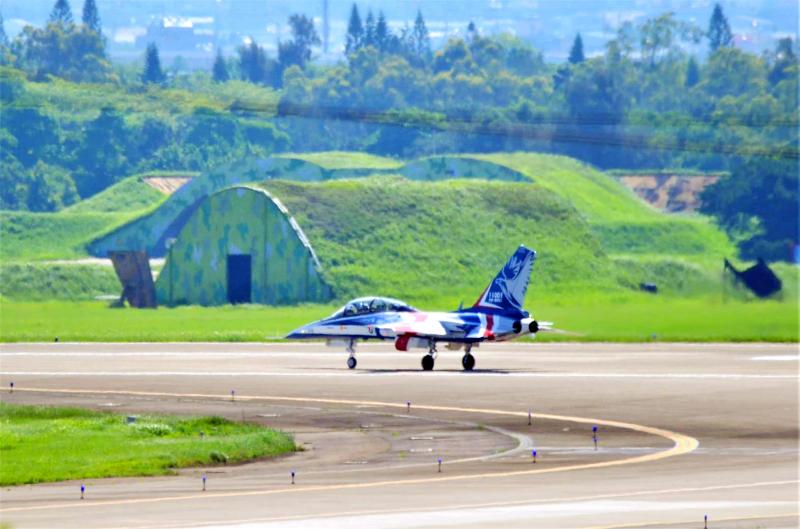The nation’s first indigenously manufactured advanced jet trainer, the Aerospace Industrial Development Corp (AIDC) T-5 (AT-5) Yung Ying (勇鷹, “Brave Eagle”), yesterday conducted its first preflight taxi test ahead of its planned flight test later this month.
Manufactured by AIDC, the AT-5 is scheduled to undergo flight testing at about the time of the Dragon Boat Festival, said a Ministry of National Defense official, who spoke on condition of anonymity.
The taxi test was conducted at the Ching Chuan Kang Air Force Base (清泉崗) in Taichung by AIDC, the ministry and the air force.

Photo courtesy of Military News Agency
The ministry did not announce the test to avoid attracting a crowd, but despite its best efforts, aviation enthusiasts still appeared in droves, the official said.
“We need to make some adjustments according to the results of the taxi tests, but plans for a first test flight in late June have not changed,” the official said, adding that test schedules have not been affected by the COVID-19 pandemic.
“We plan to hold two to three more taxi tests, including high-speed taxi tests, before the test flight,” the official said, adding that President Tsai Ing-wen (蔡英文) would be invited to oversee the test flight.
Two AIDC Indigenous Defense Fighters would be accompanying and assessing the test flight, as well as recording the event, the official said.
The initial test flight would be simple, with the AT-5 taking off and circling above the airport at a limited height before landing, the official said, adding that the airplane’s landing gear would remain extended during the flight.
The airplane’s design was completed in March 2018, with the A1 prototype — intended for testing — completed on Sept. 4 last year, the official said.
AIDC plans to deliver 66 AT-5s to the air force by 2026 to replace the AT-3s, which the air force plans to retire.

Alain Robert, known as the "French Spider-Man," praised Alex Honnold as exceptionally well-prepared after the US climber completed a free solo ascent of Taipei 101 yesterday. Robert said Honnold's ascent of the 508m-tall skyscraper in just more than one-and-a-half hours without using safety ropes or equipment was a remarkable achievement. "This is my life," he said in an interview conducted in French, adding that he liked the feeling of being "on the edge of danger." The 63-year-old Frenchman climbed Taipei 101 using ropes in December 2004, taking about four hours to reach the top. On a one-to-10 scale of difficulty, Robert said Taipei 101

Nipah virus infection is to be officially listed as a category 5 notifiable infectious disease in Taiwan in March, while clinical treatment guidelines are being formulated, the Centers for Disease Control (CDC) said yesterday. With Nipah infections being reported in other countries and considering its relatively high fatality rate, the centers on Jan. 16 announced that it would be listed as a notifiable infectious disease to bolster the nation’s systematic early warning system and increase public awareness, the CDC said. Bangladesh reported four fatal cases last year in separate districts, with three linked to raw date palm sap consumption, CDC Epidemic Intelligence

US climber Alex Honnold left Taiwan this morning a day after completing a free-solo ascent of Taipei 101, a feat that drew cheers from onlookers and gained widespread international attention. Honnold yesterday scaled the 101-story skyscraper without a rope or safety harness. The climb — the highest urban free-solo ascent ever attempted — took just more than 90 minutes and was streamed live on Netflix. It was covered by major international news outlets including CNN, the New York Times, the Guardian and the Wall Street Journal. As Honnold prepared to leave Taiwan today, he attracted a crowd when he and his wife, Sanni,

Taiwanese and US defense groups are collaborating to introduce deployable, semi-autonomous manufacturing systems for drones and components in a boost to the nation’s supply chain resilience. Taiwan’s G-Tech Optroelectronics Corp subsidiary GTOC and the US’ Aerkomm Inc on Friday announced an agreement with fellow US-based Firestorm Lab to adopt the latter’s xCell, a technology featuring 3D printers fitted in 6.1m container units. The systems enable aerial platforms and parts to be produced in high volumes from dispersed nodes capable of rapid redeployment, to minimize the risk of enemy strikes and to meet field requirements, they said. Firestorm chief technology officer Ian Muceus said